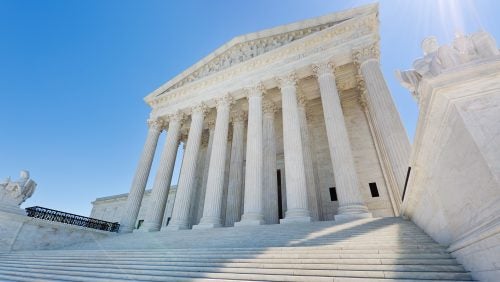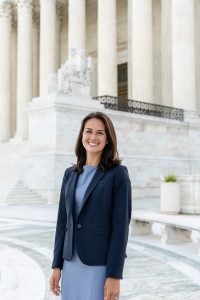Georgetown Law Alumna to Serve as Supreme Court Clerk
July 1, 2025

The U.S. Supreme Court building.
The fifth Georgetown Law graduate in nine years has secured a Supreme Court clerkship. Kate Hardiman Rhodes, L’22, will clerk for Supreme Court Justice Amy Coney Barrett during the October 2025 term. A graduate of Georgetown Law’s evening program, Rhodes worked at a D.C. litigation firm while pursuing her law degree. She is the fourth evening student to clerk for the Supreme Court since 2016.
“It is a great honor to clerk for Justice Barrett, and I am excited to learn from her and all of the other clerks,” said Rhodes, who previously clerked for Judge Trevor McFadden of the U.S. District Court for the District of Columbia and Judge Gregory Katsas of the U.S. Court of Appeals for the D.C. Circuit. “I don’t think this opportunity would have been possible if I had pursued law school in a traditional manner.”
Rhodes is among the latest graduates of the Georgetown Law Evening Program to clerk for the nation’s highest court: Of the last five Law Center students to secure Supreme Court clerkships, four are graduates of the top-ranked Evening Program, which enrolls some 30 students each year and allows students to work full-time while pursuing a law degree.
The other evening students to serve as recent Supreme Court clerks are Claire Cahill, L’19, who recently completed a clerkship with Justice Brett Kavanaugh, Betsy Henthorne, L’14, a 2016 clerk for Justice Elena Kagan and Tiffany Wright, L’13, a 2016 clerk for Justice Sonia Sotomayor.
Overall, graduates from the classes of 2016 through 2025 have secured more than 1,100 clerkships on state and federal courts in all 50 states. Others have served within administrative agencies and on international tribunals, according to Judicial Clerkships Director Michele Hoff, whose team provides guidance and resources for students interested in pursuing clerkships.
Theoretical and practical learning
For Rhodes, who previously taught high school English in Chicago while earning a master’s degree in education from the University of Notre Dame, the Law Center’s Evening Program held immediate appeal.

Kate Hardiman Rhodes, L’22
“I was drawn to the Evening Program because it enables both theoretical and practical learning,” she said. “I loved the format of [the Notre Dame] program and thought it would be great to do something similar for law school.”
While earning her law degree, Rhodes worked full-time as a research assistant at Cooper & Kirk, the D.C. litigation firm. “My day job enabled me to learn from highly skilled lawyers and gain practical research and writing skills that equipped me well for practice as a litigator,” she said of her time as a research assistant. “Working while going to school also taught me how to manage time effectively and study well under time pressure.”
Rhodes also credits the judges for whom she clerked. “It was a blessing to clerk for Judge McFadden and Judge Katsas. They are deep thinkers, precise writers and incredibly kind mentors. They both helped improve my legal judgment and writing, and they continually inspire me to high standards of professional excellence.”
Former Evening Program Director and Visiting Professor Jeffrey Shulman, L’05, himself a graduate of the program, underscores that evening students balance a number of personal, professional and academic responsibilities. “It is no surprise that the Evening Program has become a pathway to success on the clerkship market,” he said. “Of course, the true measure of success is not only what our students accomplish, but how they accomplish it. Our Evening Program students — with their support for one another, with their camaraderie and collegiality, with their dedication to their cohort — embody the success for which Georgetown Law stands.”